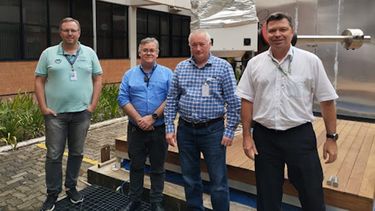Thanks to a long-standing collaboration with Mexican and Brazilian solar and space scientists - funded by The Royal Society International Exchanges scheme and mobility programmes - Dr Gary Verth, from the School of Mathematics and Statistics, and Professor Viktor Fedun, from Automatic Control And Systems Engineering - members of Plasma Dynamics Group - were invited to attend the XIV Latin American Conference on Space Geophysics held in Monterrey, Mexico.
Alongside useful scientific discussions, during the conference they also had a unique opportunity to observe the total solar eclipse and collect high-resolution images which can be used for the analysis of solar corona and prominences.
“The total solar eclipse is a natural phenomenon which provides scientists with a unique opportunity to better understand the physics of the chromosphere and solar corona,” said Dr Verth.
“This year’s total solar eclipse lasted for more than four minutes and was visible across Mexico and the USA.”
Dr Verth and Professor Fedun are members of the international consortium to research waves in the lower solar atmosphere WaLSA and obtained data can be used for masters and PhD projects as it will include image processing, work with large data volumes and physical interpretation of obtained results.

